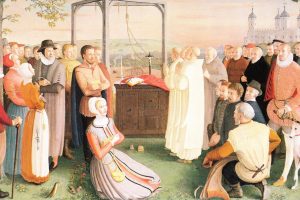Fr Neil’s homily at the Votive Mass for the English Martyrs
on the fiftieth anniversary of their canonisation
We are surrounded by so great a cloud of witnesses, let us lay aside every weight, and sin that clings so closely, and let us run with perseverance the race that is set before us.
Fifty years ago Pope St Paul VI canonised forty of the Martyrs of England and Wales, victims of the English Reformation. Although we might ask the question of why it took over 300 years to recognise these saints who so obviously gave up their lives for the sake of Christ and his Body the Church, it is a timely reminder to the faithful today of the price our ancestors in the Faith were prepared to pay in fidelity to Christ.
The forty were made up of priests, who were hanged, drawn and quartered for proclaiming the gospel and celebrating mass; and religious and lay folk who aided, hid and supported those priests and the celebration of the mass. The lay folk were either hanged or crushed to death. They all rejected the Act of Supremacy, refusing to acknowledge the English sovereign as head of the Church in England.
We might be mindful of the issues today around who has the right to dictate whether, when and how we celebrate the sacraments. We could be in real danger of giving up to the State the right of the Church to govern its own sacramental life, one of the very issues for which these martyrs gave up their lives.
Many of these martyrs were young men who, having been at seminary in Europe, came back to these shores as priests, knowing that they would almost certainly be martyred. What was it that drove and enabled these martyrs to face such hardships, torture and death?
What seems to have captured their hearts was a vision and encounter with Christ that enabled them to see beyond the material world, a world that is beautiful but fallen, governed and directed by principalities and powers directly opposed to the revelation of God.
It is this world that salvation history tells us God has long planned to redeem through Christ “who for the joy that was set before him endured the cross, despising the shame, and is seated at the right hand of the throne of God.”¹
The suffering servant in Isaiah has long been seen as foretelling this world’s ultimate fulfilment in Christ’s own passion: “who was wounded for our transgressions, he was bruised for our iniquities; upon his was the chastisement that made us whole, and with his stripes we are healed.”²
Holy men and women throughout that salvation history attested to that hope with their sufferings and death, “of whom the world was not worthy”³. The martyrs we celebrate today stand in a long tradition of bearing witness to Christ and his Church with the shedding of their blood.
Their sacrifice will not make any sense to us if we ourselves have lost the awareness of humanity’s need for salvation and are unable to see beyond the mere physical world. The response of so many in the Church to the ‘Covid crisis’ makes me worry that a vision of God and heavenly glory and spiritual realities has been profoundly lost.
That this is so is evident in the amount of energy expended in the guidelines and procedures to make mass “safe” again, as well as the critical vigilance and social pressure on anyone who might not be conforming to the new norm. It strikes me as bizarre and I am left wondering what would happen if a third of that energy was directed to the spiritual and eternal health of people’s souls, endeavouring to approach the mass with a sense of spiritual carefulness, heavenly awe and the need to be in a state of grace? We have bishops stamping their authority on priests who might not gel their hands enough or wear masks while distributing the sacrament of our Lord, but who are conspicuously silent when priests knowingly preach things contrary to Church teaching and abuse the liturgy of the mass.
The martyrs we celebrate today remind us that to be clothed with Christ through baptism means to follow in his footsteps, to seek his will and to bear witness to his saving passion. To be faithful to Christ is not the preserve of the saints and martyrs but the vocation of all the baptised. If we are not to abandon the divine truth of God’s Word made flesh and revealed through his Church, then at times we must stand against the spirit of the age.
This sense of dying to the world, the flesh and the Devil is part of the pilgrimage of faith that all who are disciples of Christ must embrace. The cross and Calvary cannot be avoided as they are the means of our salvation. The martyrs continue to highlight the inescapable focus on the sacrificial nature of the mass, and that our participation in the mass requires the offering up of ourselves in sacrificial thanksgiving to the Father in the light of the Passion of Christ.
Let us therefore not be surprised that in attempting to be faithful to the word of truth we find ourselves in conflict with the world. However, let us stand with fortitude because “we are surrounded by so great a cloud of witnesses.”⁴ Let us “run with perseverance the race that is set before us,”⁴ so that we might by God’s grace claim the crown of everlasting glory.
¹ Hebrews 12:2
² Isaiah 53:5
³ Hebrews 11:38
⁴ Hebrews 12:1
The editorial title to this article is a line from the Stabat Mater.








 Posts
Posts